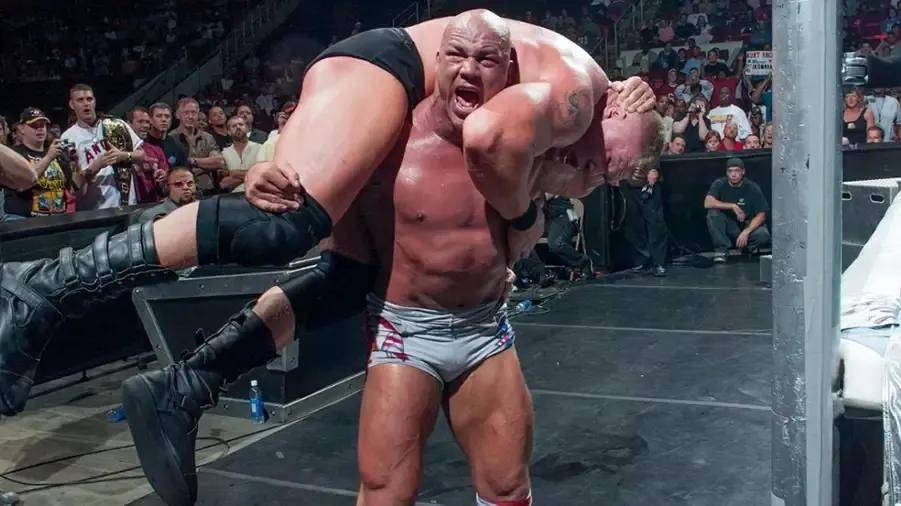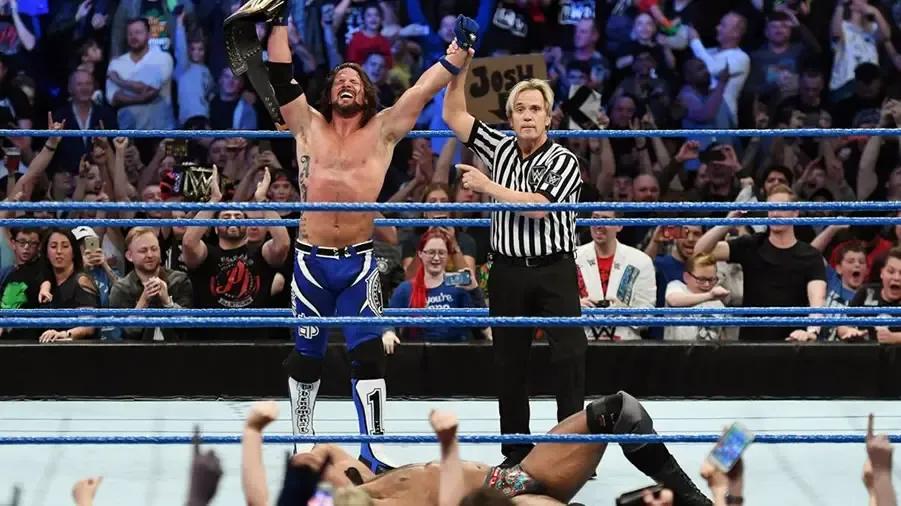10 Greatest Superstars In WWE SmackDown Live History
As we look forward to SmackDown 1000, who is the blue brand's GOAT?

Oct 16, 2018
In times where Raw and SmackDown each house separate rosters, SmackDown would earn a reputation as a fan-friendly, workhorse-filled showcase that contrasted starkly to the glitzier, more mainstream red brand. Perception is reality, and it's easy to see why - while Raw gets more internal attention (due to its proximity to pay-per-views for "fallout" broadcasts, and Monday's established status as "the wrestling night"), SmackDown would be seen as the scrappy underdog of the two, which may explain part of its appeal to diehard fans.
In the course of its time as existence as a separate entity from Raw, SmackDown stars would become synonymous with the brand. Even with annual drafts and Superstar Shake-Ups, there are just some individuals that make you think of Thursday nights on UPN or Friday nights on The CW Network more than others.
While the labels of "SmackDown guy" and "Raw guy" are subjective, a fair number of stars have definable periods in their career where their home brand was seemingly part of their identity. This list looks at those wrestlers for whom refuge on the blue show on Thursday/Friday nights (or even Tuesday nights) is how they're, at least in part, remembered by the hardcore fans that hail SmackDown as number one.

When WWE Champion Lesnar made SmackDown his full-time home shortly after SummerSlam 2002, the brand began to centre around the superhuman exploits of the 25-year-old Kodiak bear/cyborg hybrid creature. For the next year-and-a-half, Lesnar remained adjacent to the main event scene, trading blows and throws with Kurt Angle, The Undertaker, and others, while simultaneously flattening undercard driftwood in unflinching fashion.
Lesnar's residence as the king of SmackDown was most notable in 2003, a time in which the Raw main event scene was flooded out with seemingly one WCW has-been after another. Lesnar was fresh in more than one sense, and possibly would have remained SmackDown's resident killing machine had he not tired of the WWE lifestyle by the time of his spring 2004 exit.

There was kind of a weird energy transfer in the midst of the 2005 Draft, when SmackDown superhero John Cena migrated to Raw (to a huge pop, don't let others tell you otherwise), and Batista eventually made his way over to SmackDown. The champ swap seemed to benefit Cena in every way except for crowd noise, while Batista's momentum from the brilliantly-executed break from Evolution seemed to fizzle out.
Over the next few years, Batista managed to regain some of that mojo, re-establishing himself as an unflappable superman that kids could believe in, and could put naysayers into the ground with a bone-ratting Powerbomb. Batista may not have been Cena's equal as far as being a top hero goes, but he more than held his own in the role, and was a great fit for that spot on SmackDown.

In his three years as an exclusive Thursday night grappler, Angle ran the gamut. He looked heroic in battles with Brock Lesnar and John Cena, just as he was every bit the conniving villain in wars with Eddie Guerrero and Booker T. Angle could also look suitably neutral in technical classics with Chris Benoit, as well as his epic encounters with The Undertaker for major gold.
These days, Angle's more synonymous with Raw, thanks to his not-always-smooth tenure as the show's General Manager. A decade in TNA also makes his time on SmackDown feel like it was aeons ago (and really, it was). But in those three years, Angle was an indispensable part of the show, excelling in whatever role he happened to be placed in.

There don't seem to be too many wrestlers in the current brand split era that have cemented themselves as a foundation of the brand quite like Styles. The likes of The Miz, New Day, Usos, Becky Lynch, and others have built up considerable equity in their time on SmackDown since mid-2016, but Styles supersedes all of them, mostly through his consistent presence at the top of the roster.
Styles' second run as WWE Champion may be marred by the fact that he's only gone on last on two pay-per-views in that time (both SmackDown-exclusive shows), but his typically-excellent performances in WWE Championship bouts give the brand some genuine stability, as well as a figure that you can build a big match around, knowing his work will put it at a high level. As far as the modern era of SmackDown goes, Styles has been the undisputed ace.

Mysterio was one of those guys you figured would never end up on Raw. He made his debut on SmackDown in the summer of 2002, and hearing anybody except Michael Cole and Tazz call his matches just wouldn't feel right. Of course, Cole and Mysterio went over to Raw in the same 2008 shake-up, so at least that didn't change. But Rey not being on SmackDown? Just absurd.
Mysterio's initial six-year run on the show saw him demonstrate needed flexibility, able to volley between adding life to the Cruiserweight division, as well as gelling well with the big boys of the main event scene. Like Styles, Mysterio was one of those workhorses that you knew was going to give you mesmerizing TV whenever he stepped between the ropes.

While Edge was initially a SmackDown talent in 2002-03 (as part of the vaunted SmackDown Six), his best work on the blue brand wouldn't be realized until he brought Mr. Kennedy's Money in the Bank briefcase over to the show in the spring of 2007. His Ultimate Opportunist act on Raw in 2005-07 put him in the pantheon, and the continuation of it on SmackDown cemented him there.
Whether he was making the most of a sham marriage with Vickie Guerrero, or ducking behind every available line of defence in order to keep him and his World title reigns in tact, Edge was the ideal villain, the man whose unchecked dastardliness brought the best out of an endless parade of babyface heroes. Tommaso Ciampa totally had an Edge poster on his wall.
Latino Heat realized his true potential in the summer of 2003, combining charming insincerity with cunning cleverness to create an act that few others could have brought real gravity to: a deceitful schemer whose deadpan demeanour and sheer balls made him impossible to boo. WWE had to turn him babyface in accordance with the positive reactions he received, and once he mixed babyface fire into the existing cauldron, there was WWE's new main event star.
Guerrero was already imbuing SmackDown with his normal level of tremendous wrestling, so the manifestation of what he could be as a total character only livened up the shows. His reach as a wrestling star was vast, his charisma boundless. It's safe to say that SmackDown wasn't even close to the same show after his untimely passing, that no performer could ever adequately replace him.

The dad-haired Cena we see today delivering the absurd Lightning Fist was partially birthed by, of all things, him demonstrating some freestyle wordsmithery whilst dressed as Vanilla Ice on Halloween 2002. Every gain made by Cena in the 16 years since owes its pulse to an unlikely breakout moment that would lead WWE to continue mining Cena's cool and calm charisma for everything it was worth. The supply might just be endless.
Though Cena's time on Raw was in part blemished by fans booing him like a silent movie villain every chance they got, on SmackDown he was the hottest thing in the business, popping crowds with his ribald insults and clever rhymes while sporting some truly snazzy throwback sporting attire. His in-ring work would vastly improve later, but the freshness of Cena on SmackDown was a special time.

Longevity is a big part of Undertaker's placement, as the unquestioned legend anchored SmackDown for most of its first life as a separate-but-nominally-equal entity next to Raw. For babyface matchmakers, he was the ultimate trump card, waiting to be unleashed on whatever asshole deserved a little wrath. In general, his legacy and his presence added authority to every angle he was in, even the far-fetched ones.
That's why Undertaker earns such high marks more than any other reason, because of his induplicable gravity. Such a cornerstone for SmackDown was Undertaker that it seemed like every heel worth his evil breath would have to do battle with the resident spectre of death sooner or later. You can always tell SmackDown history in that decade by who Undertaker was feuding with at the time.

For the top entry, I'm going to employ a little cheat, since it's impossible to talk about the history of WWE SmackDown without bringing up the man from whom the show's name was spawned from. When the show began in 1999 with a name that invokes what Rock liked to "layeth", it made sense that he would be the star of the program. Perhaps more than any other wrestler, Rock would best personify SmackDown.
His browbeating of backstage interviewers, his inappropriate taunts of various befuddled villains - in the early days of SmackDown, The Rock was an absolute tour de force, carrying the shows with his energy and his wit. The early days of SmackDown in the first split were enhanced by Rock's two-month run as a brand-hopper, and SmackDown benefited wholly from a heavy dose of The Great One.